yeovil people
francis theophilus robins
Solicitor
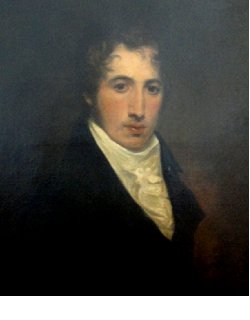 Francis
Theophilus
Robins was born
on 4 May
1787 in Bristol
and baptised in
Bristol
Cathedral on 11
May 1791 - the
same day as his
younger sister
Hannah Maria
(b1788).
Francis
Theophilus
Robins was born
on 4 May
1787 in Bristol
and baptised in
Bristol
Cathedral on 11
May 1791 - the
same day as his
younger sister
Hannah Maria
(b1788).
He was the only son of Thomas Robins (1758-1812) and his first wife, Marianne née Camplin (1751-1828). From his father's will, we know that Francis had three sisters.
Francis was born shortly before his father, the Reverend Thomas Robins DD (1758-1812), a minor canon of Bristol Cathedral in 1788 and Master of the Grammar School of St Mary Redcliffe, moved to South Petherton to become its Vicar.
In 1805, Francis was articled for five years to the law firm of Edmund Batten and John Batten.
On 9 December 1813 at St John's church, Francis married Elizabeth Upton (1791-1859), the daughter of Yeovil solicitor George Proctor Upton (1763-1827) and Eleanor née Leach (1761-1848). Francis and Elizabeth were to have at least five children; Marianne (b1814), George Upton (1816-1895), Frances, Eleanor (1821-1825) and Florence (1827-1917).
Francis and Elizabeth lived initially in South Petherton where Francis held land. The parish records of South Petherton record that Francis held the position of 'Grass Hayward' there in 1827. A parish position, the Grass Hayward's duties included inspecting the hedges and fences of the parish, tending fields set aside to produce hay and also to impound stray animals. The position was also known as the Field Master.
It is almost a given that Francis worked in his father-in-law's law firm, most likely before his marriage but certainly afterwards. After the death of George Proctor Upton in 1827 Francis became head of the law firm. It would appear from the census records that when Francis moved his family to Yeovil they lived in the house next door to his father-in-law (which was also the offices of the law practice) in Rackleford - at this time the name of today's Market Street, which was also known as Rotten Row.
An indenture in my collection, dated 1 May 1843, shows that Francis was leasing the property annually either from fellow Yeovil solicitors John Batten Senior or John Batten Junior. The indenture describes the property as follows "... All that Messuage or Dwellinghouse with the Stable Outhouses Court and Gardens thereto adjoining and belonging formerly in the occupation of Edward Watts and since then of Markes Lambe and now of the said Francis Theophilus Robins containing in the front from East to West fifty one feet bounded on the North by the street now called Rackleford on the South by the Garden of Mr John Greenham on the East by a Dwellinghouse and Garden of the late Mr George Proctor Upton and on the West by a Dwellinghouse and Premises in the Possession of Mr Hilborne which said Dwellinghouse was erected by the said Edward Watts on some part of the Garden or Orchard belonging to a Messuage or Dwellinghouse near unto a place called Millers Well in Yeovil aforesaid heretofore belonging to John Old and Christopher Jeans ...".
In 1831 there were riots in England when Parliament decided against reform to give Britain's industrial cities and towns better representation. Many of the solicitors in Yeovil were active anti-Reformers and had been professional election agents of Lord Ashley. Consequently these were the first to be singled out by an angry mob on the night of Friday, 21 October 1831, in what was to become known as the Yeovil Reform Riot of 1831, who attacked the home of Francis Robins as well as the homes of Edwin Newman, William Lambert White, John Slade and Edwin Tomkins.
The following is an extract from the 5 April 1832 edition of the London newspaper, True Sun, reporting on the trial of the rioters at the Taunton Assizes of 3 April 1832 "Edward Dodge, Edward Miller, John Curwood, Richard Marks and John Baker, were indicted for having riotously assembled and begun to demolish the house of Francis Theophilus Robins. Mr FT Robins, an Attorney of Yeovil, stated - "On Friday, the 21st of October, soon after ten o'clock in the evening, I saw a mob, consisting of several hundreds, coming down a field in which my house stands. A brick wall, five feet high, divides my garden from that field. They pushed down the wall. Mrs Robins was so alarmed that she insisted on going to a cottage near. I heard the destruction of the windows and doors of my house, apparently accomplished with stones, sticks and bricks. The mob continued there two hours. The windows and shutters were completely demolished. Every window in the house was destroyed. The damage done amounted to more than £300 (about £24,000 at today's value)." Corroborative testimony was called as in the last case but the prisoners were all acquitted."
In the South Petherton Poll Books for both 1832 and 1834 Francis was listed as living in Yeovil but was listed by virtue of owning a property called Dry Hams in South Petherton. In the Somerset Gazette Directory of 1840 he was listed twice; as an Attorney of Reckleford and as an agent for Norwich Union Fire & Life Insurance of Reckleford. (George Upton had been listed in the 1822 edition of Pigot's Directory as an Attorney of Reckleford), Francis was also a member of the Yeovil Vestry.
In 1834 the Western Gazette reported "The Lord Chief Justice of His Majesty's Court of Common Please has been pleased to appoint John Batten and Francis Theophilus Robins, both of Yeovil, gentlemen, to be two of the Perpetual Commissioners for taking the acknowledgements of married women, under the Act for the Abolition of Fines and Recoveries, for Somerset." Although not mentioned in this report, the Bath Chronicle noted that John Slade was also included.
In the 1841 census Francis and Elizabeth were both listed as being 50 years old (bearing in mind that the 1841 census generally rounded people's ages up to the nearest multiple of 5 if they were aged 15 or more) and living in Rotten Row with their children George, Eleanor, Florence and three servants. Next door was Elizabeth's widowed mother Eleanor Upton, living with Francis and Elizabeth's daughter Marianne and three servants.
In the Notices of Deaths in its edition of 20 January 1849, both the Bristol Mercury and the Bristol Times and Mirror noted identically "Jan 5, at Yeovil, aged 62, Francis Theophilus Robins, Esq." and the Hampshire Advertiser noted that Francis died "of apoplexy" (that is, a stroke). He was buried in Yeovil on 11 January 1849.
In the 1851 census Elizabeth, listed as a widow, was living in Rotten Row with her three unmarried daughters Marian, Eleanor and Florence together with three servants. Elizabeth died during the 1850s but it is not possible to tell exactly when since six women called Elizabeth Robins died in Yeovil during that decade.
Footnote
1
Somerset Records
Office holds
pre-marriage
settlements of
Florence and
Eleanor,
daughters of
Francis
Theophilus
Robins of
Yeovil,
deceased, to
Arthur Burridge
of Bridport,
Gentleman, and
William Hole of
Alcombe Lodge,
Dunster,
Esquire, 1851
and 1856, ¼ of
lands in Walcot
(tithe nos. 274,
275) and close
called Dryhams
in South
Petherton,
reciting the
will of Florence
Robins of
Bristol, widow,
deceased.
Footnote
2a
I have an
indenture or
lease for one
year in my
collection,
dated 1
May 1843 and
made between
John Batten
(probably the
Younger) of the
first part and
Francis
Theophilus
Robins of the second
part for premises
in
Rackleford
(today's Market
Street) - see
map below - for
Francis' house next
door to that of
his
father-in-law
George Proctor
Upton.
Footnote
2b
I have an
indenture of
security in my
collection,
dated 3 May 1843
and also between
Robins and
Batten for a
loan of £2,185
7s 7d (around
£230,000 at
today's value)
made in
connection with
Robins' premises
held as
security.
Although
incredibly
complex and
long-winded,
this document
gives a very
good account of
the properties
held by Robins
in Walcot, Bath,
Somerset, that
were offered as
collateral.
Further, this
document names
Florence as the
wife of Francis'
father the
Reverend Thomas
Robins, rather
than Francis'
mother who is
known to have
been Marianne
née Camplin
(1751-1828).
Therefore,
although I could
find no record
of a marriage
between Thomas
and Florence, it
must have been
after 1828.
Footnote
2c
Following
the death of
Francis
Robins in
1849, I have an
indenture or
transfer of
mortgage in my
collection,
dated 21
April 1851. It
was
made between
John Batten of
the first part
and George
Robins (son of
Francis
Theophilus
Robins) of the
second part for
premises that
had been his
father's house
in which his
mother,
Elizabeth, still
lived.

Francis Robins' signature against the Vestry minutes of 29 December 1831.
Maps
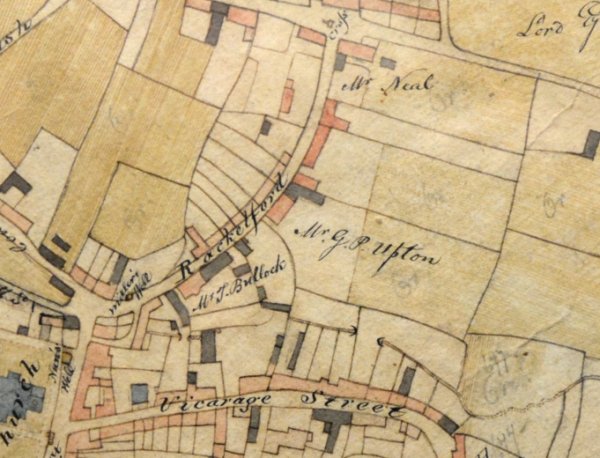
Edward Bullock Watts' map of Yeovil of 1806 shows the home and law office of George Proctor Upton at centre, on the eastern side of Rackleford (today's Market Street). When Proctor died in 1827, Robins took over the firm.
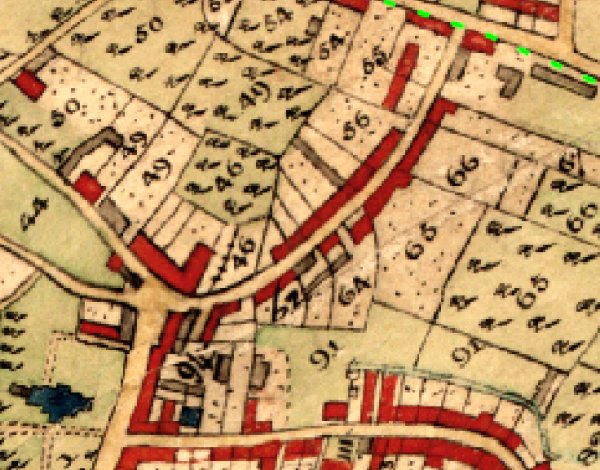
An extract of the 1842 Tithe map (also by Edward Bullock Watts) showing George Proctor Upton's house, garden and orchard marked as Parcel 65 (although at this time occupied by his widow Eleanor) and Francis Robins' property next door and marked as Parcel 64.
GALLERY
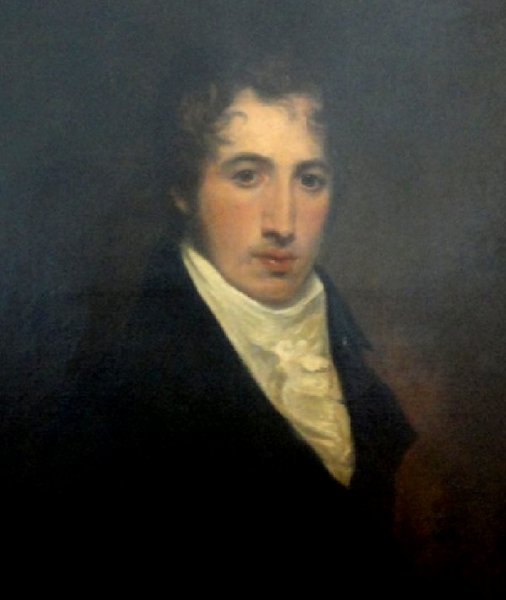
Courtesy of
Deborah Lockwood
Francis
Theophilus
Robins
1787-1849
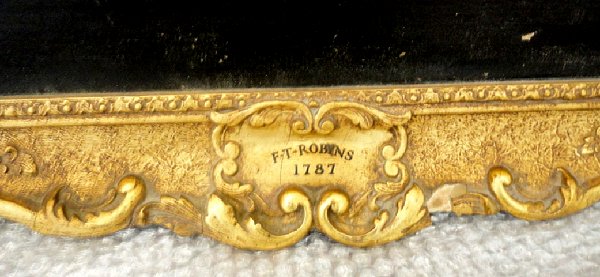
Courtesy of
Deborah
Lockwood
The nameplate on the gilt frame of the above portrait (albeit spelt Robyns) suggesting the date of his birth to be 1787.

The entry of Francis' baptism from the parish register of Bristol Cathedral
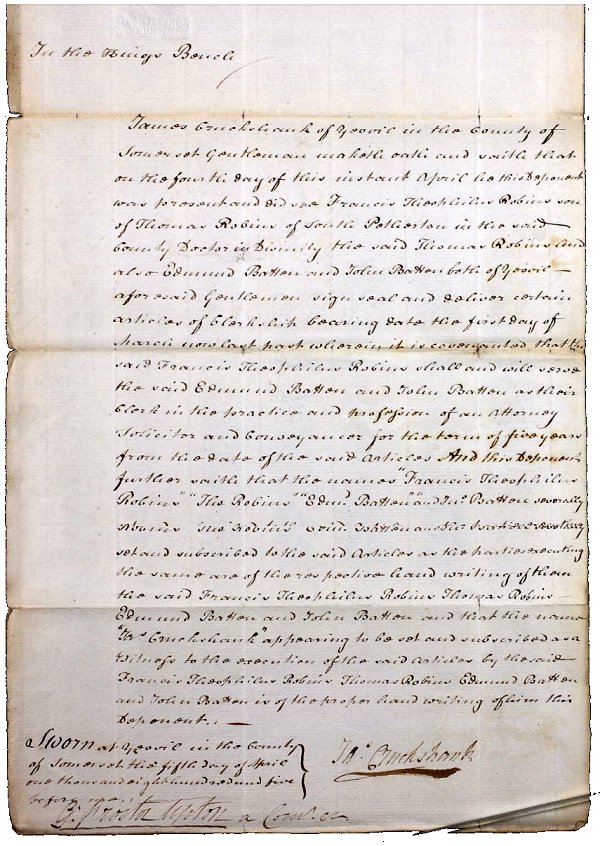
Francis Robins' articles of 1805. He was articled for five years to Edmund and John Batten.
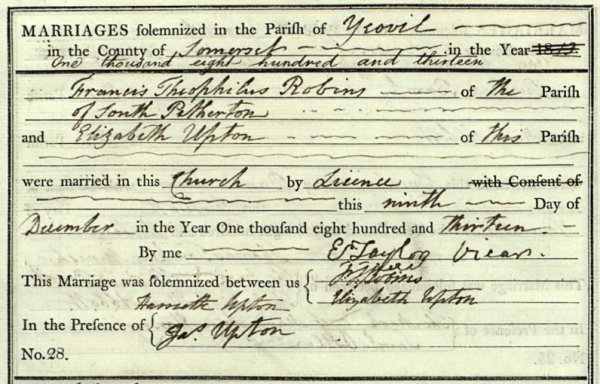
The record of the 9 December 1813 marriage of Francis and Elizabeth from St john's register.
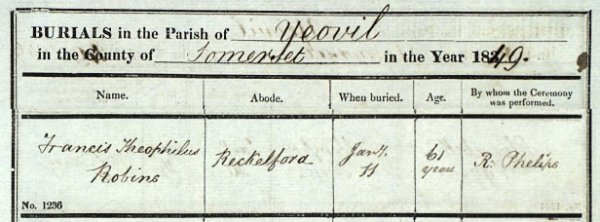
The entry of Francis Robins' burial from St John's parish register.